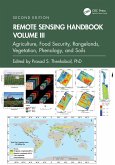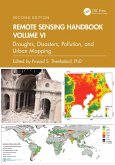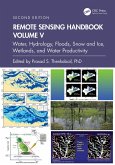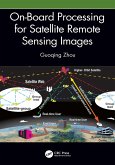Remote Sensing Handbook, Volume V (eBook, ePUB)
Water, Hydrology, Floods, Snow and Ice, Wetlands, and Water Productivity
Redaktion: Thenkabail, Prasad S.
52,95 €
52,95 €
inkl. MwSt.
Sofort per Download lieferbar

26 °P sammeln
52,95 €
Als Download kaufen

52,95 €
inkl. MwSt.
Sofort per Download lieferbar

26 °P sammeln
Jetzt verschenken
Alle Infos zum eBook verschenken
52,95 €
inkl. MwSt.
Sofort per Download lieferbar
Alle Infos zum eBook verschenken

26 °P sammeln
Remote Sensing Handbook, Volume V (eBook, ePUB)
Water, Hydrology, Floods, Snow and Ice, Wetlands, and Water Productivity
Redaktion: Thenkabail, Prasad S.
- Format: ePub
- Merkliste
- Auf die Merkliste
- Bewerten Bewerten
- Teilen
- Produkt teilen
- Produkterinnerung
- Produkterinnerung

Bitte loggen Sie sich zunächst in Ihr Kundenkonto ein oder registrieren Sie sich bei
bücher.de, um das eBook-Abo tolino select nutzen zu können.
Hier können Sie sich einloggen
Hier können Sie sich einloggen
Sie sind bereits eingeloggt. Klicken Sie auf 2. tolino select Abo, um fortzufahren.

Bitte loggen Sie sich zunächst in Ihr Kundenkonto ein oder registrieren Sie sich bei bücher.de, um das eBook-Abo tolino select nutzen zu können.
Volume V of the Remote Sensing Handbook , Second Edition, is focused on the use of remote sensing technologies for studying water resources including groundwater, floods, snow and ice, and wetlands. This book provides an essential resource for researchers at all levels interested in using remote sensing.
- Geräte: eReader
- mit Kopierschutz
- eBook Hilfe
- Größe: 47.81MB
Andere Kunden interessierten sich auch für
![Remote Sensing Handbook, Volume III (eBook, ePUB) Remote Sensing Handbook, Volume III (eBook, ePUB)]() Remote Sensing Handbook, Volume III (eBook, ePUB)199,95 €
Remote Sensing Handbook, Volume III (eBook, ePUB)199,95 €![Remote Sensing Handbook, Volume I (eBook, ePUB) Remote Sensing Handbook, Volume I (eBook, ePUB)]() Remote Sensing Handbook, Volume I (eBook, ePUB)52,95 €
Remote Sensing Handbook, Volume I (eBook, ePUB)52,95 €![Remote Sensing Handbook, Volume IV (eBook, ePUB) Remote Sensing Handbook, Volume IV (eBook, ePUB)]() Remote Sensing Handbook, Volume IV (eBook, ePUB)52,95 €
Remote Sensing Handbook, Volume IV (eBook, ePUB)52,95 €![Remote Sensing Handbook, Volume VI (eBook, ePUB) Remote Sensing Handbook, Volume VI (eBook, ePUB)]() Remote Sensing Handbook, Volume VI (eBook, ePUB)52,95 €
Remote Sensing Handbook, Volume VI (eBook, ePUB)52,95 €![Remote Sensing Handbook, Volume II (eBook, ePUB) Remote Sensing Handbook, Volume II (eBook, ePUB)]() Remote Sensing Handbook, Volume II (eBook, ePUB)52,95 €
Remote Sensing Handbook, Volume II (eBook, ePUB)52,95 €![Remote Sensing Handbook, Volume V (eBook, PDF) Remote Sensing Handbook, Volume V (eBook, PDF)]() Remote Sensing Handbook, Volume V (eBook, PDF)52,95 €
Remote Sensing Handbook, Volume V (eBook, PDF)52,95 €![On-Board Processing for Satellite Remote Sensing Images (eBook, ePUB) On-Board Processing for Satellite Remote Sensing Images (eBook, ePUB)]() Guoqing ZhouOn-Board Processing for Satellite Remote Sensing Images (eBook, ePUB)131,95 €
Guoqing ZhouOn-Board Processing for Satellite Remote Sensing Images (eBook, ePUB)131,95 €-
-
-
Volume V of the Remote Sensing Handbook, Second Edition, is focused on the use of remote sensing technologies for studying water resources including groundwater, floods, snow and ice, and wetlands. This book provides an essential resource for researchers at all levels interested in using remote sensing.
Dieser Download kann aus rechtlichen Gründen nur mit Rechnungsadresse in A, B, BG, CY, CZ, D, DK, EW, E, FIN, F, GR, HR, H, IRL, I, LT, L, LR, M, NL, PL, P, R, S, SLO, SK ausgeliefert werden.
Produktdetails
- Produktdetails
- Verlag: Taylor & Francis eBooks
- Erscheinungstermin: 29. November 2024
- Englisch
- ISBN-13: 9781040203491
- Artikelnr.: 72276411
- Verlag: Taylor & Francis eBooks
- Erscheinungstermin: 29. November 2024
- Englisch
- ISBN-13: 9781040203491
- Artikelnr.: 72276411
- Herstellerkennzeichnung Die Herstellerinformationen sind derzeit nicht verfügbar.
Dr. Prasad S. Thenkabail, Senior Scientist (ST), United States Geological Survey (USGS), is a world-recognized expert in remote sensing science with major contributions in the field for nearly 40 years. He has made the list of the world's top 1% of scientists across 22 scientific fields and 176 sub-fields. Dr. Thenkabail has conducted pioneering research in hyperspectral remote sensing of vegetation, global croplands, and their water use for food security. He obtained his PhD from the Ohio State University in 1992 and has 168 peer-reviewed publications including 15 books, including this six-volume set, and over 15 major data releases such as the Landsat-derived global cropland extent product @ 30m and Landsat-derived rainfed and irrigated cropland area product @ 30 m (LGRIP30). He was recognized as a Fellow of the American Society of Photogrammetry and Remote Sensing (ASPRS) in 2023. His scientific papers have won several awards for demonstrating world-class, highest-quality research. He was a Landsat Science Team Member (2007-2011).
Part I: Geomorphology. 1. Geomorphological Studies from Remote Sensing.
Part II: Hydrology and Water Resources. 2. Remote Sensing Technologies for
Multi-scale Hydrological Studies: Advances and Perspectives. 3. Groundwater
Targeting Using Remote Sensing. Part III: Floods. 4. Flood Monitoring using
the Integration of Remote Sensing and Complementary Techniques. 5. Flood
Studies using Synthetic Aperture Radar Data. 6. Remote Sensing of Mangrove
Forests. Part IV: Wetlands. 7. Remote Sensing of Mangrove Wetlands. 8.
Wetland Mapping Methods and Techniques Using Multi-Sensor, Multi-Resolution
Remote Sensing: Successes and Challenges. 9. Inland Valley Wetland
Cultivation and Preservation for Africa's Green and Blue Revolution using
Multi-Sensor Remote Sensing. Part V: Water Use and Water Productivity. 10.
Remote Sensing of Evapotranspiration from Croplands. 11. Modeling and
Monitoring Water Productivity by Using Geotechnologies: Assessments in some
Brazilian Agroecosystems. Part VI: Snow and Ice. 12. Remote Sensing Mapping
and Modeling of Snow Cover Parameters and Applications. Part VII: Summary
and Synthesis for Volume V. 13. Remote Sensing Handbook, Volume V: Water
Resources, Hydrology, Floods, Snow and Ice, Wetlands, and Water
Productivity.
Part II: Hydrology and Water Resources. 2. Remote Sensing Technologies for
Multi-scale Hydrological Studies: Advances and Perspectives. 3. Groundwater
Targeting Using Remote Sensing. Part III: Floods. 4. Flood Monitoring using
the Integration of Remote Sensing and Complementary Techniques. 5. Flood
Studies using Synthetic Aperture Radar Data. 6. Remote Sensing of Mangrove
Forests. Part IV: Wetlands. 7. Remote Sensing of Mangrove Wetlands. 8.
Wetland Mapping Methods and Techniques Using Multi-Sensor, Multi-Resolution
Remote Sensing: Successes and Challenges. 9. Inland Valley Wetland
Cultivation and Preservation for Africa's Green and Blue Revolution using
Multi-Sensor Remote Sensing. Part V: Water Use and Water Productivity. 10.
Remote Sensing of Evapotranspiration from Croplands. 11. Modeling and
Monitoring Water Productivity by Using Geotechnologies: Assessments in some
Brazilian Agroecosystems. Part VI: Snow and Ice. 12. Remote Sensing Mapping
and Modeling of Snow Cover Parameters and Applications. Part VII: Summary
and Synthesis for Volume V. 13. Remote Sensing Handbook, Volume V: Water
Resources, Hydrology, Floods, Snow and Ice, Wetlands, and Water
Productivity.
Part I: Geomorphology. 1. Geomorphological Studies from Remote Sensing.
Part II: Hydrology and Water Resources. 2. Remote Sensing Technologies for
Multi-scale Hydrological Studies: Advances and Perspectives. 3. Groundwater
Targeting Using Remote Sensing. Part III: Floods. 4. Flood Monitoring using
the Integration of Remote Sensing and Complementary Techniques. 5. Flood
Studies using Synthetic Aperture Radar Data. 6. Remote Sensing of Mangrove
Forests. Part IV: Wetlands. 7. Remote Sensing of Mangrove Wetlands. 8.
Wetland Mapping Methods and Techniques Using Multi-Sensor, Multi-Resolution
Remote Sensing: Successes and Challenges. 9. Inland Valley Wetland
Cultivation and Preservation for Africa's Green and Blue Revolution using
Multi-Sensor Remote Sensing. Part V: Water Use and Water Productivity. 10.
Remote Sensing of Evapotranspiration from Croplands. 11. Modeling and
Monitoring Water Productivity by Using Geotechnologies: Assessments in some
Brazilian Agroecosystems. Part VI: Snow and Ice. 12. Remote Sensing Mapping
and Modeling of Snow Cover Parameters and Applications. Part VII: Summary
and Synthesis for Volume V. 13. Remote Sensing Handbook, Volume V: Water
Resources, Hydrology, Floods, Snow and Ice, Wetlands, and Water
Productivity.
Part II: Hydrology and Water Resources. 2. Remote Sensing Technologies for
Multi-scale Hydrological Studies: Advances and Perspectives. 3. Groundwater
Targeting Using Remote Sensing. Part III: Floods. 4. Flood Monitoring using
the Integration of Remote Sensing and Complementary Techniques. 5. Flood
Studies using Synthetic Aperture Radar Data. 6. Remote Sensing of Mangrove
Forests. Part IV: Wetlands. 7. Remote Sensing of Mangrove Wetlands. 8.
Wetland Mapping Methods and Techniques Using Multi-Sensor, Multi-Resolution
Remote Sensing: Successes and Challenges. 9. Inland Valley Wetland
Cultivation and Preservation for Africa's Green and Blue Revolution using
Multi-Sensor Remote Sensing. Part V: Water Use and Water Productivity. 10.
Remote Sensing of Evapotranspiration from Croplands. 11. Modeling and
Monitoring Water Productivity by Using Geotechnologies: Assessments in some
Brazilian Agroecosystems. Part VI: Snow and Ice. 12. Remote Sensing Mapping
and Modeling of Snow Cover Parameters and Applications. Part VII: Summary
and Synthesis for Volume V. 13. Remote Sensing Handbook, Volume V: Water
Resources, Hydrology, Floods, Snow and Ice, Wetlands, and Water
Productivity.







